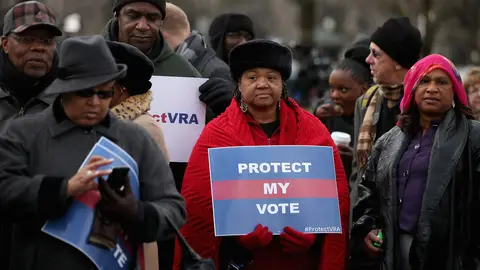On Democracy: We Must Still Be Vigilant About Voting Rights

When the Voting Rights Act was signed into law on Aug. 6, 1965, it was the apex of a long and arduous civil rights movement. It happened because of a number of key motivating factors: the desire for full citizenship, the audacity to march, willingness to build coalitions and the strength to break down doors that would otherwise be closed. What motivated those Freedom Fighters and pioneers in the '60s should also motivate us today, as the right to vote is once again threatened.
This year, the U.S. Supreme Court invalidated Section 4 of the Voting Rights Act, essentially gutting an essential protection of the Voting Rights Act. As a result, the rights of millions of voters hang in the balance. We are already witnessing attempts of state legislatures to significantly restrict the voting rights of people of color and others in places like North Carolina, South Carolina and Texas.
But the Supreme Court left us with a clear course of action, giving Congress the distinct ability to act and within that is a silver lining. Since 1965, Congress has reauthorized the Voting Rights Act with sweeping bipartisan Congresses. It has been signed into law by four Republican Presidents. After signing an extension of the Voting Rights Act in 1982, President Ronald Reagan stated that “voting is the crown jewel of our liberties, and it's something that we as Republicans and Americans will never permit to be infringed upon.” He was right then and he is right today.
Last week, Congressman Jim Sensenbrenner (R-Wisconsin) stated that the Supreme Court presented Congress with both a challenge and an historic opportunity, noting that voter discrimination still exists and that “progress toward equality should not be mistaken for a victory." It is clear that this Congress has the moral obligation to hold voting rights as an intricate tenet of our democracy, and not as a tool for political wrangling. This month, as Congressional members on both sides of the aisle are in their home districts, it is vital that we make sure they hear this message.
There is an incredible movement building in our nation. We should draw inspiration from the thousands of voters that are protesting extremism in North Carolina’s Moral Mondays to the uplifting movement led by the Dream Defenders in Florida. It is important that we are present at every meeting, town hall, or hearing held by members of Congress. It is also important that we continue the discussion online and make our voices heard, using petitions and social media. We must use every tool at our disposal to amplify the message that voting rights is a priority in our nation.
This year, we are celebrating the 50th anniversary of several pivotal moments in this nation’s history — the assassination of Medgar Evers, the 16th Street Baptist Church bombing and the March on Washington. As we reflect, let us remember that each of those moments propelled the movement for justice and freedom forward. Like then, let the pivotal moments of our time drive us to move this nation forward.
Whether or not Congress will actually move to fix Section 4 of the Voting Rights Act and restore our most vital protection, the future of voting rights ultimately lies within our collective willingness to act. The future of our democracy is dependent upon our actions.
Jotaka L. Eaddy is the senior adviser to the president and CEO and senior director for voting rights for the NAACP. You can follow Jotaka for more commentary and updates at @JotakaEaddy, #OnDemocracy. Text “vote” to 62227 to stay up to date on the NAACP’s Voting Rights Initiative.
The opinions expressed here do not necessarily reflect those of BET Networks.
BET National News - Keep up to date with breaking news stories from around the nation, including headlines from the hip hop and entertainment world. Click here to subscribe to our newsletter.
(Photo: Chip Somodevilla/Getty Images)





